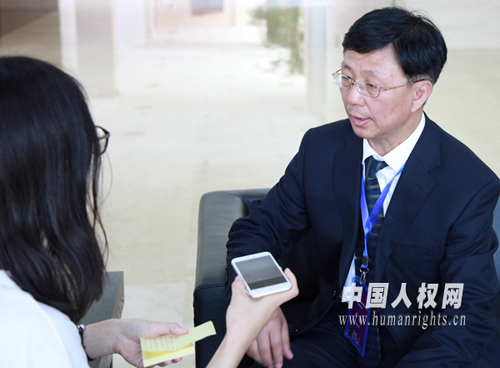
June 14, 2017 -- Professor Chang Jian, director of Human Rights Research Center of Nankai University and executive member of China Society for Human Rights Studies (CSHRS), gets interviewed by chinahumanrights.org. (Photo: Jiao Fei/chinahumanrights.org)
June 14, 2017 -- The seminar on “Building a Community of Shared Future for Mankind and Global Human Rights Governance”, co-sponsored by China Society for Human Rights Studies (CSHRS) and the Publicity Department of Tianjin and organized by Human Rights Research Center of Nankai University, was held on June 8th in Tianjin.
In the era of globalization, the interdependence of all countries is increasing despite their diversified interests. Therefore, global governance is urgently needed for the world,” said Professor Chang Jian, director of Human Rights Research Center of Nankai University.
Professor Chang talked with chinahumanrights.org after the seminar.
chinahumanrights.org: Why do we need global governance? What’s the relationship between global governance and global human rights governance?
Professor Chang: The world is witnessing both growing interdependence between nations and their diversified interests. Each country may seek the maximum of its own interests unless the global governance is put in place. As a result, Prisoner's Dilemma will come true. The global governance aims at maximizing the interests of mankind and achieving win-win cooperation by coordinating the actions of countries.
As an important part of global governance, global human rights governance aims to promote the realization of human rights in all countries. The realization of global governance, from the perspective of global human rights governance, requires every country shoulder their due responsibilities to ensure the realization of international collective human rights.
chinahumanrights.org: What is the problem of the current global human rights governance? Why should we see global human rights governance from the perspective of a community of shared future for mankind?
Professor Chang: As to the human rights governance in the past years, we can see a contradictory phenomenon. On the one hand, the establishment of the United Nations Human Rights Council brings more and more constraints on human rights, but on the other hand, the international hegemonism prevails in the world. For example, at the national level, some countries can ignore the resolution of the United Nations to invade another country. This is a serious violation of human rights and we need to do some reflections.
I think that one of the biggest problems in global human rights governance is the confusion of individual sovereignty and international collective sovereignty. The individual sovereignty should be guaranteed by the governments, which should be a country's internal affairs. The collective human rights should be protected by the international community. However, there is an overwhelming emphasis on the protection of individual human rights, which makes it possible for some countries to intervene in the internal affairs of other countries with the excuse of protecting individual human rights. In fact, the collective human rights are likely to be sacrificed.
The reason that we should think about the global human rights governance from the perspective of a community of shared future for mankind is that the global human rights governance has triggered various problems, such as imbalanced national development, widening gap between the rich and the poor, the prevalence of terrorism, and global environmental degradation. While unipolar hegemony guarantees the international order, it also intensifies these global problems. Thus we need to add the dimension of international collective human rights to international human rights governance. The idea of building a community of shared future for mankind proposed by President Xi Jinping has provided an important enlightening theoretical basis for the establishment of international collective human rights. This philosophy is opposed to western hegemonism, safeguards the collective human rights of all peoples, and promotes global human rights governance.
chinahumanrights.org: You mentioned international collective human rights. Please give us a brief introduction of this concept.
Professor Chang: International collective human rights should mainly include the people's right to subsistence, development, peace, environment, self-determination and equality. The main body of international collective human rights is mankind. The scope of rights covers the basic conditions necessary for the survival and development of all peoples. As the stakeholders of international collective human rights, each country and the people must work together to promote the realization of the collective human rights of mankind.
chinahumanrights.org: What’s the relationship between Building a Community of Shared Future for Mankind and International Collective Human Rights?
Professor Chang: The protection of human rights entails limiting state power, while international collective human rights fend off international hegemonic acts. International hegemonic act is a violation of collective human rights and a source of global governance dilemmas. The idea of building a community of shared future for mankind transcends the limitations of the western concept of liberal human rights and recognizes the status of the international collective human rights with the people as the main body.
The establishment of a community of shared future for mankind is key for solving the dilemma of global human rights governance. It requires governments to share common and mutual obligations with respect to international collective human rights. With the equal principle of broad consultation, joint contribution and shared benefits, we can break the prisoner's dilemma, prevent hegemonic acts and maximize the interests of mankind.
People have come to realize that the human society must unite as one in front of common threats. No country can solve these problems on its own. All the countries of the world need to strengthen coordination and cooperation, and establish a consensus on building a community of shared future for mankind.


